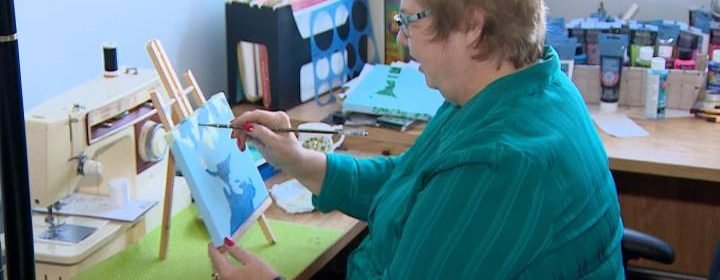‘You can live a full life’: Halifax doctor and patient shed light on bladder cancer

Every year, thousands of Canadians will be diagnosed with bladder cancer.
It’s treatable if caught early, but can be fatal if not. That’s why doctors and patients alike are hoping to shed light on the disease.
Elaine Jeffery of Halifax was diagnosed with bladder cancer five years ago. The cancer was discovered while she was undergoing treatment for uterine cancer, which was completely unrelated to her bladder cancer.
“What they did discover is that I had two separate cancers at the same time. I’m an overachiever, what can I tell you?” she said with a laugh.
Her spirits remained high, however, despite an occurrence of the bladder cancer a few months later.
“At that point then, I had to go in and have the bladder cancer surgery, it’s scary and you don’t know what to expect,” she said.
Jeffery had a urostomy and now uses a urostomy bag daily, but far from letting it slow her down, it’s given her a new lease on life.
Since her recovery, Jeffery has travelled extensively, including a recent trip to South America. She’s also taken up painting.
“You can live a full life. I’ve done some pretty extensive trips. So people who are travelling just always remember take twice as much [urostomy bags] as you think you’ll need and then some more,” she said.
Unfortunately, not all Canadians diagnosed with bladder cancer get to follow the same path.
“About 8,900 cases were diagnosed in 2017 and about 2,400 deaths,” said Dr. Ricardo Rendon, a urology professor at Dalhousie University.
Ricardo is considered an expert in the field and explains bladder cancer comes in two forms: non-muscle invasive, which is more treatable, and muscle invasive, which means the cancer has spread deeper.
“At that time, treatment in the bladder, inside the bladder don’t work. So what we have to do is more aggressive treatment, such as surgery or sometimes a combination with surgery and radiation and chemotherapy,” he said.
The Maritimes tends to see more cases of bladder cancer, and Ricardo says prevention is key.
“In the Maritimes, it’s a smaller region but we actually have more bladder cancer than in other areas and that is mostly directly related to the fact that more people here smoke cigarettes and bladder cancer is directly related to cigarette smoking,” he said.
He stresses that people should not hesitate to speak to a doctor if symptoms appear, regardless of how difficult or awkward the conversation may be.
“As soon as any person has blood in their urine, they should see their family doctor or walk-in clinic if they don’t have a family doctor,” he said.
Early detection means the cancer can be treated sooner, which leads to a better chance of recovery from the fifth-most common form of cancer in Canada.
“So when you think about being alone, you’re not,” Jeffery said.
— With a file from Jeremy Keefe
Source: Read Full Article
